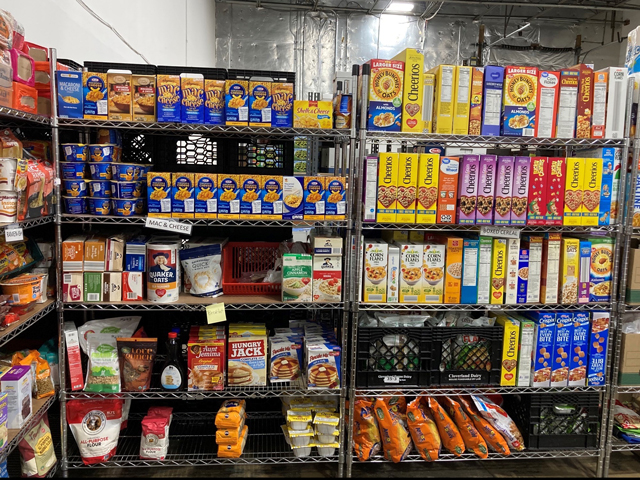Checking out the Goal and Vision Behind Food Pantry Lockhart
Checking out the Goal and Vision Behind Food Pantry Lockhart
Blog Article
Why Supporting Your Neighborhood Food Pantry Is Essential for Assisting Those in Need
The significance of supporting neighborhood food pantries can not be overemphasized, especially in the context of food insecurity, which influences a disconcerting number of people and families within our communities. These important sources not just offer immediate relief from cravings but additionally contribute to broader social benefits, including enhanced wellness and educational outcomes. As we explore the complex function of food pantries, it becomes apparent that their effect extends much past just distributing food (Food Pantry Lockhart). Comprehending this deeper connection may motivate a reconsideration of just how we involve with and sustain these crucial establishments.
Comprehending Food Instability
Food insecurity affects approximately 10.5% of households in the United States, illustrating a significant public wellness issue that transcends simple hunger. It describes the absence of regular access to sufficient food for an energetic, healthy and balanced life. This problem can bring about a variety of adverse results, including poor wellness, raised health care costs, and decreased academic efficiency amongst youngsters.
The sources of food insecurity are multifaceted, frequently coming from financial variables such as unemployment, hardship, and underemployment. Geographical location can likewise play a critical role, with food deserts-- locations with minimal access to economical and nourishing food-- exacerbating the problem - Food Pantry Lockhart. Additionally, systemic aspects, consisting of social and racial inequities, add to the disproportionate influence of food instability on marginalized communities
Resolving food insecurity is not merely concerning increasing food supply; it calls for a detailed technique that incorporates financial security, education, and community assistance. Food insecurity not only affects individual wellness however additionally has wider ramifications for social health and wellness and productivity. Recognizing its intricacy is vital for establishing efficient treatments and fostering long-lasting services that guarantee all individuals have trustworthy accessibility to healthy food.
The Function of Food Pantries
Neighborhood food cupboards function as essential lifelines for family members and people dealing with food insecurity. They provide important food items to those that may have a hard time to pay for adequate nourishment due to economic difficulty, unemployment, or unexpected situations. By dispersing food at no charge, these organizations assist minimize appetite and avoid the unfavorable health influences connected with inadequate diets.
Food kitchens commonly partner with regional farms, grocery stores, and neighborhood companies to resource a variety of healthy food things, including fresh fruit and vegetables, dairy products, and proteins. This collaboration makes certain that pantry clients get not just food however likewise healthier alternatives that contribute to general health.
In addition, food cupboards work as area hubs, promoting connections amongst locals and giving a feeling of self-respect to those in requirement. Many pantries supply added resources, such as nutrition education and learning and recommendations to social solutions, assisting customers browse their obstacles better.
In essence, food pantries play a multifaceted role in combating food insecurity. They not only address prompt hunger but likewise empower family members and individuals to boost their situations, therefore promoting neighborhood durability and cohesion.

Benefits of Sustaining Food Pantries

Supporting food kitchens not only nurtures those in requirement however likewise enhances the fabric of the neighborhood. By offering essential food sources, food kitchens minimize appetite and minimize food instability, which click here to read is crucial for the health and wellness and well-being of people and families. Accessibility to nourishing food adds to improved physical wellness, far better academic outcomes for kids, and enhanced mental health, thus cultivating an extra productive and engaged community.
Furthermore, supporting food kitchens promotes social communication. These organizations function as centers for community interaction, combining volunteers, donors, and receivers in a common objective to combat cravings. This partnership can damage down barriers, foster understanding, and construct connections amongst diverse area members.
In addition, contributions to food pantries, whether in the kind of food, funds, or time, boost the neighborhood economy. Lots of food pantries prioritize sourcing from local producers, therefore sustaining regional farming and organizations. This creates a cycle of support that benefits not just those in helpful site requirement but the neighborhood in its entirety.
Just How to Get Included
Involvement with food kitchens can take numerous forms, enabling individuals and teams to make a significant effect in their areas. Monetary donations are additionally vital, as they allow food cupboards to purchase fresh fruit and vegetables and crucial materials.
Offering your time is an additional impactful method to sustain neighborhood food pantries. Numerous organizations rely upon volunteers for arranging, packing, and distributing food. This hands-on participation not just assists the kitchen but likewise cultivates a feeling of neighborhood. In enhancement, take into consideration organizing click to investigate food drives within your school, office, or area group to increase understanding and gather resources.
Partnerships with local services can better boost support for food kitchens. By taking these teams, individuals and steps can dramatically strengthen the efforts of regional food pantries and assist those in requirement.
Neighborhood Impact and Link
Identifying the extensive impact of food pantries on area health is necessary for promoting a spirit of link and collaboration. Food kitchens offer not only as essential resources for those dealing with food insecurity however likewise as hubs for community engagement. They combine varied teams-- customers, volunteers, and benefactors-- creating an environment where individuals can connect and sustain each other.
The influence of food pantries prolongs past plain provision of food; they function as a stimulant for social cohesion. By participating in kitchen initiatives, neighborhood members can develop connections that go beyond socioeconomic barriers. This network of support helps to dismantle the stigma typically associated with food assistance, fostering an environment of approval and understanding.
In addition, food pantries typically team up with local companies, schools, and companies, enhancing their reach and performance. These partnerships improve area durability and urge a collective action to food insecurity. As people join in their efforts to support neighborhood food cupboards, they grow a feeling of common purpose and obligation, enhancing the idea that everyone has a function to play in guaranteeing that nobody goes hungry. Eventually, supporting food cupboards reinforces the fabric of the community in its entirety.
Conclusion
Supporting local food pantries is necessary in combating food insecurity and improving the health of vulnerable populaces. By guaranteeing access to nourishing food, these organizations contribute to boosted health and wellness results, educational efficiency, and mental wellness. Involvement with food pantries promotes neighborhood connections, promoting social communication and equity. Ultimately, the cumulative effort to boost these important resources plays a substantial function in building a healthier, extra durable society where all individuals have the opportunity to flourish.

Report this page